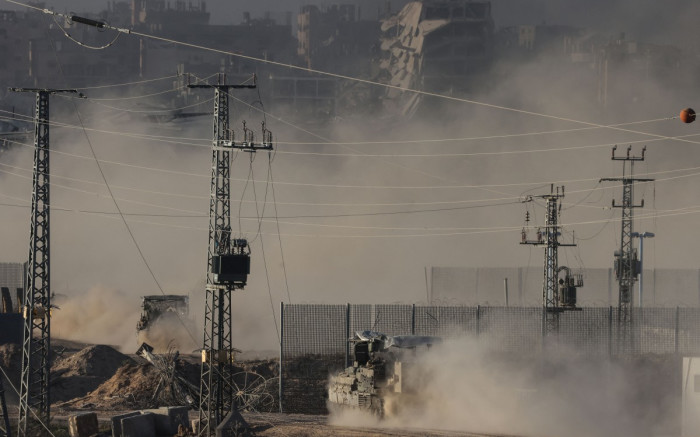
The United Nations said Israel issued evacuation orders on Wednesday for large areas of Khan Yunis, where more than 140,000 displaced people were seeking refuge.
A photo taken on December 11, 2023 in southern Israel near the border with the Gaza Strip shows Israeli army armored personnel carriers advancing into the north of the Gaza Strip as fighting continues between Israel and the militant group Hamas. Image: AFP
JERUSALEM – Israel has ordered further evacuations in the southern Gaza Strip capital as diplomats continued efforts to bring about a pause in the war that Hamas says has claimed 20,000 lives.
The United Nations said Israel issued evacuation orders on Wednesday for large areas of Khan Yunis, where more than 140,000 displaced people were seeking refuge.
At the start of the conflict, Israel called on civilians to leave the north of the besieged Palestinian territory and urged them to seek safety in southern areas.
But as places where people could turn became smaller, international outrage grew over the rising death toll.
The war began when Hamas attacked Israel on October 7, killing about 1,140 people, mostly civilians, and kidnapping about 250, according to an AFP tally based on Israeli figures.
The Hamas government’s media office in the Gaza Strip said on Wednesday that at least 20,000 people have been killed in Palestinian territory since the war with Israel began.
It was said that 8,000 children and 6,200 women were among the dead.
UN aid chief Martin Griffiths called it a “tragic and shameful milestone”.
In the southern city of Rafah, where fireballs and smoke rose after explosions on Wednesday, residents expressed hope that the ceasefire talks would be successful.
“I wish for a complete ceasefire and an end to the series of death and suffering. It has been more than 75 days,” said 25-year-old Kassem Shurrab.
ceasefire talks
Hopes that Israel and Hamas could move closer to another ceasefire and hostage release deal rose this week as the Palestinian militant group’s leader visited Egypt and talks took place in Europe.
Qatar-based Hamas chief Ismail Haniyeh arrived in Egypt on Wednesday for talks with the country’s intelligence chief, Abbas Kamel.
Haniyeh also met with Iranian Foreign Minister Hossein Amir-Abdollahian, but details were not disclosed.
A Hamas official told AFP that “a complete ceasefire and withdrawal of the Israeli occupation army from Gaza is a prerequisite for serious negotiations” on a hostage-prisoner exchange.
Israeli Prime Minister Benjamin Netanyahu said there could be no ceasefire in Gaza before the “elimination” of Hamas.
And US President Joe Biden said of a new deal on the release of hostages: “At this point there are no expectations. But we are pushing for it.”
Mossad director David Barnea held a “positive meeting” in Warsaw this week with CIA chief Bill Burns and Qatari Prime Minister Sheikh Mohammed bin Abdulrahman Al Thani, a source familiar with the talks told AFP.
Qatar, with support from Egypt and the United States, helped negotiate an initial week-long ceasefire last month in which 80 Israeli hostages were released in exchange for 240 Palestinian prisoners.
TUNNEL NETWORK
Israel said on Wednesday its troops had uncovered a network of tunnels used by Hamas leaders, including Yahya Sinwar, the leader of the Islamist movement in Gaza.
The military released footage showing the “vast network” around Palestine Square in Gaza City, connecting hideouts and homes.
The army reported hand-to-hand fighting and more than 300 attacks over the past day, while the death toll among its own forces inside the Gaza Strip rose to 134.
An AFPTV live camera captured two bombings on Wednesday in Rafah, where many of the territory’s estimated 1.9 million displaced people have fled.
Hamas’s health ministry said Israeli strikes killed at least 12 Palestinians as houses and a mosque were “attacked” in Rafah.
It was later said that at least 30 more people were killed in an Israeli strike that hit two houses east of Khan Yunis.
Crowds swarmed the rubble and dug with shovels and a backhoe to free the victims. A blackened body lay under a blue blanket on the blood-soaked floor.
“Enough, enough of this. We have lost everything and we can’t take it anymore,” said Samar Abu Luli, a woman in Rafah, after Israeli attacks on the Al-Shabura neighborhood.
A DEADLINE
The U.N. Security Council was due to try again on Thursday to pass a resolution calling for an end to the fighting after previous efforts to win Washington’s support failed.
Israel has rejected the term “ceasefire” and the US has used its veto twice since the start of the war to thwart resolutions rejected by Israel.
The United Arab Emirates supports a draft resolution on the conflict that has already been watered down to ensure a compromise, according to a draft version seen by AFP.
It calls for “an urgent cessation of hostilities to enable safe and unhindered humanitarian access and urgent steps towards a sustainable cessation of hostilities.”
International Crisis Group analyst Richard Gowan said: “There is a strong feeling that Biden will make the final decision on this matter.”
Israel, which declared a total siege of the Gaza Strip at the start of the war, has since allowed aid trucks to pass through the Rafah border crossing with Egypt and, as of this week, its own Kerem Shalom crossing.
The World Food Program announced Wednesday that it had delivered food through Kerem Shalom in a first direct aid convoy from Jordan, warning of the “risk of famine.”
FIGHTING HIZBOLLAH
The war has raised fears of regional escalation, with exchanges of fire across the Lebanese border and rockets from Iran-backed Yemeni rebels disrupting shipping in the Red Sea.
Israel said on Wednesday it had attacked an “operations command center” of Iran-backed Hezbollah fighters and fired on fighters heading toward the Lebanese-Israeli border.
Yemen’s Iran-backed Houthi rebels, who have fired missiles and drones at cargo ships in the Red Sea, warned on Wednesday that they would strike back if attacked by US forces.
The warning came after the United States said it was setting up a multinational naval task force to protect ships transiting the Red Sea from Houthi attacks carried out in solidarity with Palestinians in Gaza.






Recent Comments